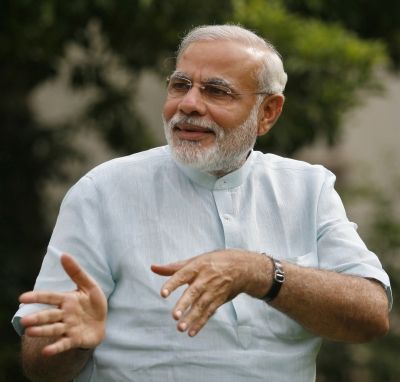 In a rare gesture, China's official media in Beijing on Tuesday extended its biggest coverage to an Indian political event projecting Narendra Modi's takeover as Prime Minister as a harbinger of "big boost" to China-India relations.
In a rare gesture, China's official media in Beijing on Tuesday extended its biggest coverage to an Indian political event projecting Narendra Modi's takeover as Prime Minister as a harbinger of "big boost" to China-India relations.
"Modi to boost ties with China", state-run 'China Daily' featured Modi's take over as PM on Monday in its lead story recalling his visit to China as the chief minister of Gujarat in 2011 with meticulous preparations.
"He (Modi) presented a business card with one side in Chinese and in red the colour that symbolises wealth and good fortune in China", it said.
"With Modi taking the oath of office as India's new Prime Minister on Monday", the Daily added, "such attention to China is expected to be repeated."
The article also included comments by some of the official think-tanks corroborating its theses projecting big boost to Sino-Indian ties under his leadership.
Modi's earlier visits to China to scout investments as well as to study the Chinese success story and concentration of much China's $900 million investments in India in Gujarat was also adequately highlighted in the coverage besides the goodwill message by Chinese Premier Li Keqiang.
Besides this, the Daily devoted half page on its back page tracing Modi's rise from grass-root politics to the prime ministership of India.
Another daily 'Global Times' too devoted a page with pictures of Modi's swearing-in ceremony specially the Indian PM greeting his Pakistan counterpart Nawaz Sharif during the event, which was also widely shown on state run CCTV with commentaries by analysts.
In its editorial titled "Congratulations to Modi", the China Daily said the "sweeping victory of Narendra Modi and his Bharatiya Janata Party in India's elections was the outcome of Modi's promise of reforms and credentials as an efficient doer in the state of Gujarat."
"A purveyor of dreams in some people's eyes, the campaigning Modi pledged to end policy-paralysis, reduce inflation and tackle corruption, some of the most outstanding stumbling blocks on India's way ahead," the editorial said.
"His pragmatic economic blueprint has been so tantalising to the market that it has reportedly boosted Indian stocks by 15 per cent so far this year," it went on adding, “the Indian rupee, too, has gained considerably."
"And his preoccupation with development, which echoes this country's own experiences and development philosophy, has inspired unprecedented optimism here over our South Asian neighbour's growth potential", it said.
Drawing an analogy with China, the editorial said: "A similar belief in and focus on development has brought China where it is today, and such a commitment to development can create an economic miracle next door in the world's second most-populous country."
"Modi is not "India's Deng Xiaoping", as some have called him, nor is Gujarat, the state which has spearheaded Indian GDP growth with him behind the helm, "India's Guangdong", it said.
"Yet as two developing countries pestered by wealth and development gaps, China and India can work together when it comes to development", it said.
Taking West to task for trying to pit China against India, it said: "Western rhetoric about China and India is seldom free from a conception that the two countries are rivals, as if the two were destined to stand against each other. But the fact that Beijing and New Delhi have, by and large, managed their differences well over the decades is proof they do not have to be."
Modi's invitation to SAARC (South Asian Association for Regional Cooperation) leaders including Pakistan's PM Sharif was also commended in the piece as "good-neighbourliness" and in-sync with China's national interest."
"Surprising as it is to outsiders, Modi's invitation to Pakistani Prime Minister Nawaz Sharif to attend his inauguration ceremony and engage in bilateral talks was actually a matter of course, as good-neighborliness is an essential external condition for India's development agenda. Which, of course, converges with China's national interest."
State-run Xinhua news agency, on the other hand, in its commentary praised Modi's initiate to invite SAARC leaders for swearing ceremony a "diplomatic coup de grace".
"The invitation to the Pakistan PM, Nawaz Sharif as well as other leaders of the SAARC countries by Modi is widely considered a diplomatic coup de grace by the new prime minister, who was thought to be a hardliner towards Pakistan by many", the Xinhua commentary said.
"However, the event, which came immediately after the ceremony which was sacred for India, could be seen as a showcase of a stronger regional foreign policy of the new government in Delhi which is putting priority to relations with its immediate neighbors in its overall diplomacy", it said.
Expecting that this step could mark a sharp break in India's foreign policy, it went on to add: "This could even signal a strategic readjustment of India's foreign policy from some empty concepts like non-aligned movement to realistic touch, first by embracing its South Asian neighbours -- some of them being poor cousins-- first."











 © 2025
© 2025